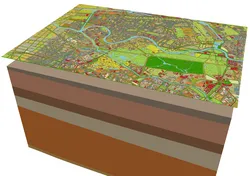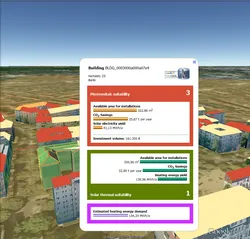Cities are the key driver of resource consumption and global emissions. Thus it is necessary to optimize urban energy usage to support climate change mitigation. Energy Atlas comprehensively maps Berlin’s energy supply, usage and efficiency in order to allow stakeholders to explore where improvements could be made and where more renewable energy can be used.
Projektbeschreibung
The Climate Change Issue
Optimizing urban energy use and reducing city carbon emissions is crucial to climate mitigation. However city developers often lack sufficient tools or knowledge to be able to reasonably assess the low carbon options which are available to them when they carry out changes to the energy infrastructure. A road map towards low-emission and sustainable energy supply must incorporate integration strategies for renewable energy into new and existing supply units and infrastructure. In order to do this effectively decision makers require sufficient information to work in partnership with energy suppliers to implement necessary developments.
The Project Solution
The Energy Atlas was developed as a tool for a holistic examination of energy consumption resp. energy demands, production and saving potentials at an urban and regional scale, focusing particularly on the incorporation of renewable energies. The project team have introduced a virtual 3D city model with a versatile multi-purpose toolset. The virtual 3D city model of Berlin serves as a common information hub, which contains more than 550,000 buildings structured regarding to the semantic data model of CityGML. The toolset integrates high resolution data on energy resources and infrastructure at a range of scales in the city. With sufficient relevant data the Energy Atlas can map the energy consumption and efficiency of buildings, existing power suppliers and network conditions in order to create an inventory of the urban energy usage. Besides mapping the existing energy usage, the Energy Atlas is used to apply a variety of analyses tools to estimate e.g. the energy demands, photovoltaic and geothermal potentials and optimal power grids and allows users to build scenarios correspondingly. Decision makers can use the model for intelligent urban management and energy infrastructure design. Transport, water and waste management are also be included into the Energy Atlas, allowing for a comprehensive tool for planning, designing and constructing sustainable energy systems in a city. The Energy Atlas model has been demonstrated using a case study of Berlin, looking particularly at issues such as geothermal energy, photovoltaic, transport, and building efficiency.
The role of the Climate-KIC network
The success of Energy Atlas is dependent on identifying reliable data and then integrating and linking them in a way which retains high levels of accuracy and comprehensibility for the users. The project partners have all worked together in order to ensure that this is the case. A number of departments from TUB worked to design the tool, carry out energy research and conduct simulations. BerP and SenWTF, as owners of the virtual 3D City Model of Berlin, respectively were crucial partner. GFZ and GASAG have carried out drilling in Berlin to estimate the potential of Berlin’s geothermal reservoirs. Likewise ChiWi and Vattenfall have both explored potential public and commercial applications for the Energy Atlas. Due to its exportability, the tool can be applied to cities beyond Berlin. The project already intends to add Potsdam (the capital city of Land Brandenburg) and the prototypical suburban region of Blankenfelde-Mahlow to the 3D model.
About Climate-KIC
Climate-KIC is an initiative of the European Institute of Innovation and Technology (EIT) with a mission to create sustainable growth by addressing climate change mitigation and adaptation. As Europe’s largest public-private innovation partnership we integrate education, entrepreneurship and innovation. By bringing together communities we help transform knowledge and ideas into economically viable products or services that help to mitigate climate change.
Projektträger
Climate-KIC am European Institute of Innovation and Technology (EIT)
Projektleiter
- Prof. Dr. Thomas H. Kolbe, TU München
- Prof. Dr. Frank Behrendt, TU Berlin
Projektpartner
- Technische Universität Berlin (TUB)
- German Research Centre for Geosciences (GFZ)
- GASAG
- Berliner Senat for Economics Technology and Women’s Issues (SenWTF)
- Berliner Partner GmbH (BerP)
- Bezirksamt Charlottenburg-Wilmersdorf in Berlin (ChWi)

